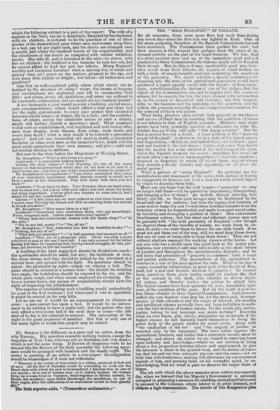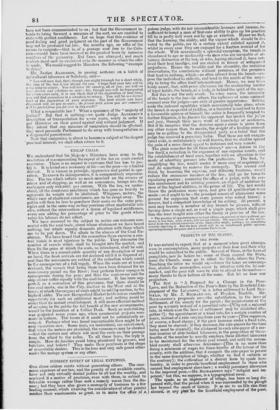THE " BOLD PEASANTRY " OF ENGLAND.
BY all accounts, there were more fires last week - than during any seven days since the first rick was lighted in Kent. One of the main purposes, therefore, of the Special Commissions has not been answered. The Commissions have quelled the riots' but their success in this respect has perhaps been the cause of in-
creased activity on the part of the stack-burners. We fear, that if a strict account were cast up of the immediate good and evil produced by these Commissions, the balance might not be found in their favour. But, be this as it may, incalculable good may here after result from their labours, the reports of which furnish us with a body of unquestionable evidence respecting the condition of the peasantry. We doubt whether a special commission for inquiring into the state of the agricultural population would have produced a report equally useful with the reports of these trials : since, notwithstanding the dictum of one of the judges, that the
object of the Cummissions was, not to huluire into the causes of crimes, but to execute the law, the trials abound with information
as to the causes of discontent and violence ; and they suggest, alike to the humane and the unfeeling, to the generous and the selfish, the pressing necessity of some comprehensive measure for the removal of those evil causes.
West India planters often defend their property in the thewcs and sinews of black men by asserting that the condition of slaves is not inferior to that of English peasants. Hitherto such state- ments have beer. generally received as calumnies on what Mr. Justice ALLAN PARK still calls " this happy country." But the fact is proved beyond a doubt. A large portion of the " freeborn people of England " is shown to be in a state of the lowest misery and degradation,—ill-lodged, and half-clothed ; not half-fed ; igno- rant and brutish to the last degree ; helots, and worse than helots (for the master has some interest in the well-being of his slave, whilst the English overseer has none) ; snatching the bread out of each other's mouths by the competition of excessive numbers ;
despised or forgotten by nearly all above them, against whom they nourish a deadly hatred; and apparently cut off from the social system !
What a picture of "merry England !" So profound arc the wretchedness and abasement of the scene, that, instead of fearing to exaggerate its horrors, one is at a loss for words of evil import by which to describe them fully.
Dog any one hope that the wild beasts—" peasantry" we may no longer call them—will be quieted by imprisoning, transporting, and hanging a few of them ? As =lye's, though starving, love liberty and life, so these poor savages may be frightened by the tread-mill and the gallows ; but does the caging and braining of
some wolves tame the rest these brutified outcasts from the fraternity of men be domesticated, and made to respect social order, by torturing and strangling a portion of them ? Men exterminate troublesome wolves • but this shortand effectual course may not be pursued with "the bold peasantry. of England,"—for though we deprive them of the benefits of society, we want them to en- dure its evils—we want them to labour for our daily bread. If we must not put them out of the way, still we must keep them down. But are we sure of being able to keep them doivn ? They are not Without abettors amongst the working classes of the towns. Let any one who has a doubt upon this point look at the penny pub- lications, now circulated and read with avidity in the small streets of London and throughout the manufacturing districts ; and he will learn that preachers of "property in common" have a large and partial audience. The insurrection of the agricultural la- bourers is a war of the .poor against the rich. What is the rise of wages, caused by intimidation, in great part of the South of Eng- land, but a new and forcible division of property ? To conceal from ourselves these plain truths, would be wisdom like that of the coward in the dark, who whistles to drown fright- ful noises, and thereby invites the robber to attack him. The higher classes have been ignorant till now, lamentably igno- rant, of the condition of the poor. But all the truth is now be- fore them—thanks to these Special Commissions, And, however selfish the very highest class may be, for the most part, in conse- quence of their education and the warps of interest, the wealthy and intelligent classes generally have not been forbidden to culti- vate the best feelings of human nature. Do the words pity, mercy, justice, belong to our language and mean nothing? Knowing what we now know, pity, mercy, and justice are as nought, if the higher classes do not instantly bestir themselves to bring the great body of the people within the social circle. Away with "the vindication of the law" and "the majesty of justice," as asserted only by the hangman! The laws which oppress the agricultural labourer, and render him a miserable savage, must be changed ; and, above all, whilst we are busied in removing taxes upon industry and knowledge,—whilst we are striving to bring about a due proportion between labour and employment, to give the labourer a share in the general weal, and the means of learn- ing that his and our true interests are one and the same,—let us treat him with tenderness ; making full allowance for our enormous neglect of him, and pouring balm on his wounded spirit, by ac- knowledging;'that for what is past we deserve the larger share of blame.
The ink with which the above remarks were written was scarcely dry, when we learned that his Majesty's Government is seriously occupied in preparing a measure for enabling unemployed labourers to proceed to the Colonies, where laboui is in great demand, and obtains a high remuneration. The details of this Emigration plan have not been communicated to us ; but that the Government in, tends to bring forward a measure of the sort, we are enabled to state with perfect confidence. Let us hope that this evidence of good feeling and good judgment on the part of the Government may not be produced too late. Six months ago, an offer of the means to emigrate—that, is, of a passage cost free to the Colo- nies—would have been received as the greatest boon by immense numbers of the peasantry. But times are changed; and much caution must now' be exercised as to the manner in which the offer is made. We would suggest to Ministers the following "example to deter."
Mr. Justice ALDERSON, in passing sentence on a batch of agricultural labourers at Salisbury, said- " You will now find, that, though you might triumph for a short while, ac arm of the law is too strong for you. I hope that your fate will be a warning to others. You will leave the country, all of you : you willsee yt,nr friends and relations no glom; for, though you will be transported for seven years only, it is not likely that at the expiration of that time, you will find yourselves in a situation to return. You will be in a distant land at the expiration of your sentence. The land which you have diwraced will see you no more ; the friends with whom you are connected will be Parted from you for ever in this world."
What a respectable law ! What a specimen of the " majesty of justice !" But that is nothing—we quote Judge ALDERSON'S description of transportation for seven years, solely in order to put Ministers on their guard against zeal without judgment. If they intend that any measure of emigration should be drectual, they must persuade Parliament to do away with transportation as a disgraceful punishment.
Now that emigration is about to become a subject of the deepest practical interest, we shall often return to it.



























 Previous page
Previous page